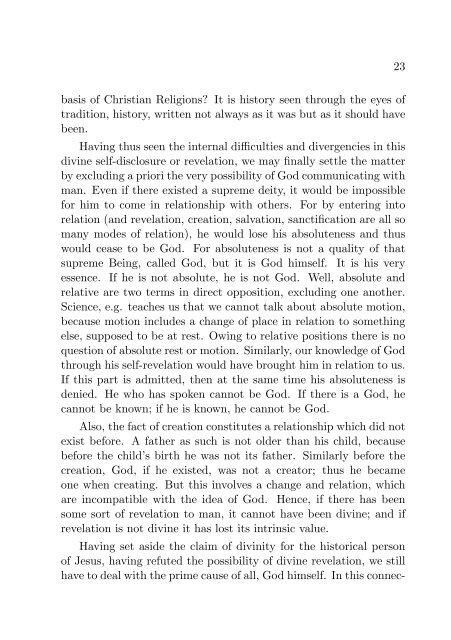Towards the Truth
Notes from a three-day debate in the 1940’s about Buddhism and Christianity.
Notes from a three-day debate in the 1940’s about Buddhism and Christianity.
You also want an ePaper? Increase the reach of your titles
YUMPU automatically turns print PDFs into web optimized ePapers that Google loves.
23<br />
basis of Christian Religions? It is history seen through <strong>the</strong> eyes of<br />
tradition, history, written not always as it was but as it should have<br />
been.<br />
Having thus seen <strong>the</strong> internal difficulties and divergencies in this<br />
divine self-disclosure or revelation, we may finally settle <strong>the</strong> matter<br />
by excluding a priori <strong>the</strong> very possibility of God communicating with<br />
man. Even if <strong>the</strong>re existed a supreme deity, it would be impossible<br />
for him to come in relationship with o<strong>the</strong>rs. For by entering into<br />
relation (and revelation, creation, salvation, sanctification are all so<br />
many modes of relation), he would lose his absoluteness and thus<br />
would cease to be God. For absoluteness is not a quality of that<br />
supreme Being, called God, but it is God himself. It is his very<br />
essence. If he is not absolute, he is not God. Well, absolute and<br />
relative are two terms in direct opposition, excluding one ano<strong>the</strong>r.<br />
Science, e.g. teaches us that we cannot talk about absolute motion,<br />
because motion includes a change of place in relation to something<br />
else, supposed to be at rest. Owing to relative positions <strong>the</strong>re is no<br />
question of absolute rest or motion. Similarly, our knowledge of God<br />
through his self-revelation would have brought him in relation to us.<br />
If this part is admitted, <strong>the</strong>n at <strong>the</strong> same time his absoluteness is<br />
denied. He who has spoken cannot be God. If <strong>the</strong>re is a God, he<br />
cannot be known; if he is known, he cannot be God.<br />
Also, <strong>the</strong> fact of creation constitutes a relationship which did not<br />
exist before. A fa<strong>the</strong>r as such is not older than his child, because<br />
before <strong>the</strong> child’s birth he was not its fa<strong>the</strong>r. Similarly before <strong>the</strong><br />
creation, God, if he existed, was not a creator; thus he became<br />
one when creating. But this involves a change and relation, which<br />
are incompatible with <strong>the</strong> idea of God. Hence, if <strong>the</strong>re has been<br />
some sort of revelation to man, it cannot have been divine; and if<br />
revelation is not divine it has lost its intrinsic value.<br />
Having set aside <strong>the</strong> claim of divinity for <strong>the</strong> historical person<br />
of Jesus, having refuted <strong>the</strong> possibility of divine revelation, we still<br />
have to deal with <strong>the</strong> prime cause of all, God himself. In this connec-
















